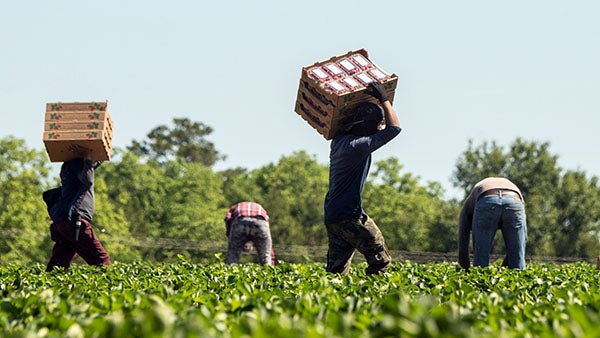ECU health sciences library kicks off webinar series on problems facing migrant farmworkers
The Laupus Health Sciences Library Diversity Committee and its partners kicked off a webinar series on issues facing migrant farmworkers on Oct. 20, with a keynote address on digital inclusion and connectivity.

Farmworkers pick strawberries in 2019 at Lewis Taylor Farms, which is co-owned by William L. Brim and Edward Walker who have large scale cotton, peanut, vegetable and greenhouse operations in Fort Valley, Georgia. (Contributed photo)
“Digital Inclusion for North Carolina Farmworkers in a Pandemic: Lessons for Implementing and Promoting a Sustainable Internet Connectivity” was presented by Natalie Rivera, internet connectivity project coordinator for the N.C. Farmworker Health Program with the N.C. Department of Health and Human Services Office of Rural Health. Dr. Leslie Cofie, assistant professor in the Department of Health Education and Promotion in ECU’s College of Health and Human Performance, was co-presenter.
Farmworkers make vital contributions to food systems and the economy. But because of the conditions they work in, they often experience serious challenges, including health disparities, food insecurities, higher instances of pesticide exposure and a lack of digital connectivity.
“With farmworkers, we were really interested in understanding their experiences in accessing health and social services as well as maintaining contact with family before and after the internet connectivity project was implemented,” Cofie said. “Some of the outcomes we were able to gain from this initiative include sustained internet connectivity for farmworkers throughout different parts of the state. Ultimately, we hope this project will result in the sustained internet connectivity for farmworkers in the long term and hopefully that would also lead to improved health outcomes for farmworkers as they now have access to telemedicine which they are able to utilize.”
Cofie added that so far, teams have been able to distribute 254 Wi-Fi hotspots to farmworkers across the state and 41 hotspots to outreach workers and health care providers. They have established 14 internet hubs in farmworker camps with a large number of farmworkers. Six growers have been reimbursed for providing internet services to their farmworker employees and more than 3,000 farmworkers now have consistent access to the internet.
“The World Health Organization considers the times in which we are living an infodemic,” said Beth Ketterman, director of Laupus Library. “We can connect them to quality literature and to educational offerings like this web series that illuminate access issues in our part of the world. The Laupus mission is to provide access to health information for quality health care delivery, research and education. A big part of that includes enriching the community with programming about how health care delivery and health information access is different for different populations.”
Laupus is hosting the series along with N.C. Farmworker Health Program, ECU College of Health and Human Performance, Student Action with Farmworkers, and the N.C. State Agromedicine Extension.
“The series has two main takeaways — first, alerting people to the health issues that migrant and seasonal farmworkers face every day to put food on our table,” said Jamie Bloss, Laupus liaison librarian. “The second would be that internet access and connectivity is a fundamental human right. It should be treated like any other necessary utility.”
Bloss said the timing for the webinar series is key because the pandemic brought to light some of the glaring problems that some populations face.
“The pandemic had a huge impact on many issues related to farmworker health from access to education for their children, access to up-to-date health information and vaccine access,” she said. “It changed how community health workers did outreach and highlighted a need for access to reliable and fast internet for telemedicine appointments as well. We have to improve access to the internet and especially fast internet, and devices to improve health outcomes. Education was a huge hurdle as well that people had to deal with over the past 18 months. A population that was already facing lots of health issues was even more exposed and at risk due to the pandemic and lack of internet connectivity.”
The webinar series also shows how Laupus Library’s grant project and other successful programs, including those that provide internet access, help to address these health disparities.
The remaining scheduled events in the series include:
- A screening of the film Harvest of Dignity followed by a discussion with Student Action with Farmworkers staff and interns that will be held on Oct. 27 at 10:30 a.m. The discussion will be moderated by Eve Portillo, NLM grant G08LM013198 advisory panel member and governing board member of the NC Farmworker Health Program.
- A panel discussion, “Digital Equity and why Digital Inclusion affects Health Outcomes,” held on Nov. 3 at 10:30 a.m., that will focus on digital equity and inclusion and how this affects delivery of health care for migrant and seasonal farmworkers. Panelists include Dr. Amy Sheon, president of Public Health Innovators, LLC and research director of the national Telehealth Equity Coalition; Rosa Miranda, Surry Medical Ministries; and Jessica Rodriguez, Vecinos: Farmworker Health Program. The panel will be moderated by Paula Acevedo, undergraduate research assistant on the National Library of Medicine grant G08LM013198.
Register to attend these virtual events. For more information about the series, contact Jamie Bloss at blossj19@ecu.edu or 252-744-3055.
The research reported was supported by the National Library of Medicine of the National Institutes of Health under Award Number G08LM013198. The content is solely the responsibility of the authors and does not necessarily represent the official views of the National Institutes of Health.